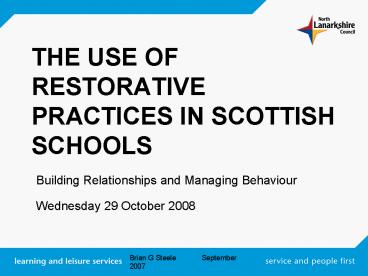THE USE OF RESTORATIVE PRACTICES IN SCOTTISH SCHOOLS PowerPoint PPT Presentation
1 / 29
Title: THE USE OF RESTORATIVE PRACTICES IN SCOTTISH SCHOOLS
1
THE USE OF RESTORATIVE PRACTICES IN SCOTTISH
SCHOOLS
Building Relationships and Managing
Behaviour Wednesday 29 October 2008
2
SOME BACKGROUND AND TERMS
- Restorative Justice
- Restorative Conferencing
- Victim/Offender Mediation
- Family Group Conferencing
- Mediation
- Circles - Circle Time
- Real Justice
- IIRP - Safer Saner Schools
- Transforming Conflict
3
Restorative Practices are fundamentally rooted
in a philosophy. They are not templates. It is
this philosophy which ought to guide the way we
act in our dealings with others.
(Ted Wachtel)
4
THE UNDERPINNING MODEL
PROCEDURES PRACTICES
SKILLS
PHILOSOPHY VALUES ETHOS
5
THE UNDERPINNING MODEL
PROCEDURES PRACTICES
SKILLS
PHILOSOPHY VALUES ETHOS
6
TWO KINDS OF DISCIPLINE
- RETRIBUTIVE
- Rule breaking
- Blame or guilt
- Adversarial
- Punish to deter
- Impersonal
- Affected ignored
- Accountability being punished
- RESTORATIVE
- Harm
- Problem solving
- Dialogue negotiation
- Restitution/ reparation
- Interpersonal
- Empowerment
- Accountability put things right
7
THE SOCIAL DISCIPLINE WINDOW
HIGH
restorative
punitive
Control (Limit Setting Discipline)
permissive
neglectful
(Wachtel and McCold)
Support (Encouragement, Nurture)
HIGH
LOW
8
CLASSROOM/SCHOOL CULTURE
HIGH
- Consistent
- Responsive
- Flexible
- Accountable
- Responsible
- Cooperation
- Negotiation
- Power Struggles
- Confrontation
- Authoritarian
- Win-Lose
- Retribution
- Stigmatising
Control
TO
WITH
- Uncaring
- Tired
- Lazy
- Burnt Out
- Given Up
- Chaotic
- Inconsistent
- Excusing
- Giving In
- Blurred
- Boundaries
- Rescuing
NOT
FOR
(Thorsborne)
HIGH
Support
LOW
9
MASLOWS HIERARCHY OF NEEDS
Self-actualisation
Universal Levels of Human Need
Self-esteem
Love,affection and belonging
Safety /Security
Physiological (Survival)
10
MASLOWS HIERARCHY OF NEEDS ?
Love,affection and belonging
Self-esteem
Self-actualisation
Safety /Security
Physiological (Survival)
11
FAIR PROCESS
Individuals are most likely to trust and
cooperate freely with systems whether they
themselves win or lose by those systems when
fair process is observed.
- The 3 principles
- Engagement
- Explanation
- Expectation clarity
(W. Chan Kim and Renee Mauborgne Harvard
Business Review)
12
ENGAGEMENT
Involving individuals in decisions that affect
them by asking for their input and allowing them
to refute the merit of one anothers ideas and
assumptions.
13
EXPLANATION
Everyone involved and affected should understand
why final decisions are made as they are. Creates
a powerful feedback loop that enhances learning.
14
EXPECTATION CLARITY
Once decisions are made, new rules are stated
clearly, so that all involved understand the new
standards and the consequences of failing to
comply.
15
WHAT FAIR PROCESS ISNT
- Decisions by consensus
- Does not set out to achieve harmony
- Does not set out to win peoples support through
compromises that accommodate every individuals
opinion, needs or interests - Democracy in the classroom, school or workplace
- Teachers/Managers forfeiting their prerogative to
make decisions, establish policies, procedures
and standards.
16
THE UNDERPINNING MODEL
PROCEDURES PRACTICES
SKILLS
PHILOSOPHY VALUES ETHOS
17
RELATEDSKILLS / COMPETENCES
- Empathy
- Emotional Literacy
- Interpersonal/Relationship Skills
- Cognitive Skills
18
RESPONDING CONSTRUCTIVELY TO OTHERS
- Listening to what they have to say
- Acknowledging their feelings
- Encouraging them to talk about their experience
19
A PECULIAR THOUGHT ?
- But let someone really listen, let someone
acknowledge my inner pain and give me a chance to
talk more about whats troubling me and I begin
to feel less upset, less confused, more able to
cope with my feelings and problems.
(Faber and Mazlish)
20
ACTIVE EMPATHIC LISTENING FOR WHAT?
- The Human Condition
Feelings/Needs
Thoughts
Behaviours
21
ACTIVE EMPATHIC LISTENING HOW?
- WHAT IT IS
- Tell me more
- Acknowledge Feeling
- Minimal Prompts
- Respectful Curiosity
- Clarifying what speaker feels/needs
- Checks Assumptions
- Accurate Feedback
- WHAT IT ISNT
- Judgements and put downs
- Shoulds Oughts Musts
- Interrogation
- Trivialisation
- Sarcasm
- Blame and Accusation
- You think youve got it bad ..
22
RESTORATIVE ENQUIRY THE PAST
- FOCUS
- Thinking (Interpretation) and Behaviour
- Thinking
- Feelings
- Others Feelings, Thoughts and Behaviours
- QUESTIONS
- Can you explain what happened ?
- What were you thinking at the time ?
- How were you feeling at the time ?
- Who else do you think has been affected by this ?
23
RESTORATIVE ENQUIRY THE PRESENT AND FUTURE
- QUESTIONS
- What have your thoughts been since ?
- What are they now ?
- How are you feeling now ?
- What do you need (to do) so that
- Things can be put right ?
- The harm can be repaired ?
- You can move on ?
- FOCUS
- Thinking
- Feelings
- Needs
- Behaviour
- Self/ Other People
24
THE UNDERPINNING MODEL
PROCEDURES PRACTICES
SKILLS
PHILOSOPHY VALUES ETHOS
25
RESTORATIVE PRACTICES CONTINUUM
FORMAL
INFORMAL
26
A FORMAT CONTINUUM
STAGES MODEL
STRUCTURE
SKILLS
Active Listening Empathy Counselling
Script
27
LEVELS OF INTERVENTION
HEALING RELATIONSHIPS REPAIRING HARM
1 - 5 Population
- Formal Conferencing
- Formal Mediation
MAINTAINING RELATIONSHIPS RESOLVING
CONFLICT
- Problem Solving Circles
- Restorative Questions
- Peer Mediation
- Solution Oriented
- Restorative Culture
- Cool in School
- PAThS
- Cooperative Learning
- Reasoning Reacting
- Circles
GROWING HEALTHY
RELATIONSHIPS PREVENTING HARM/CONFLICT
Whole School
28
RESTORATIVE PRACTICES INSCHOOLS
REPAIRING HARM
F O R M A L
I N F O R M A L
RESOLVING CONFLICT
PREVENTING HARM/CONFLICT
29
RESTORATIVE PRACTICES OR THE 3 RS FOR THE 21ST
CENTURY ?
- RELATIONSHIPS
- RESPECT
- RESPONSIBILITIES

